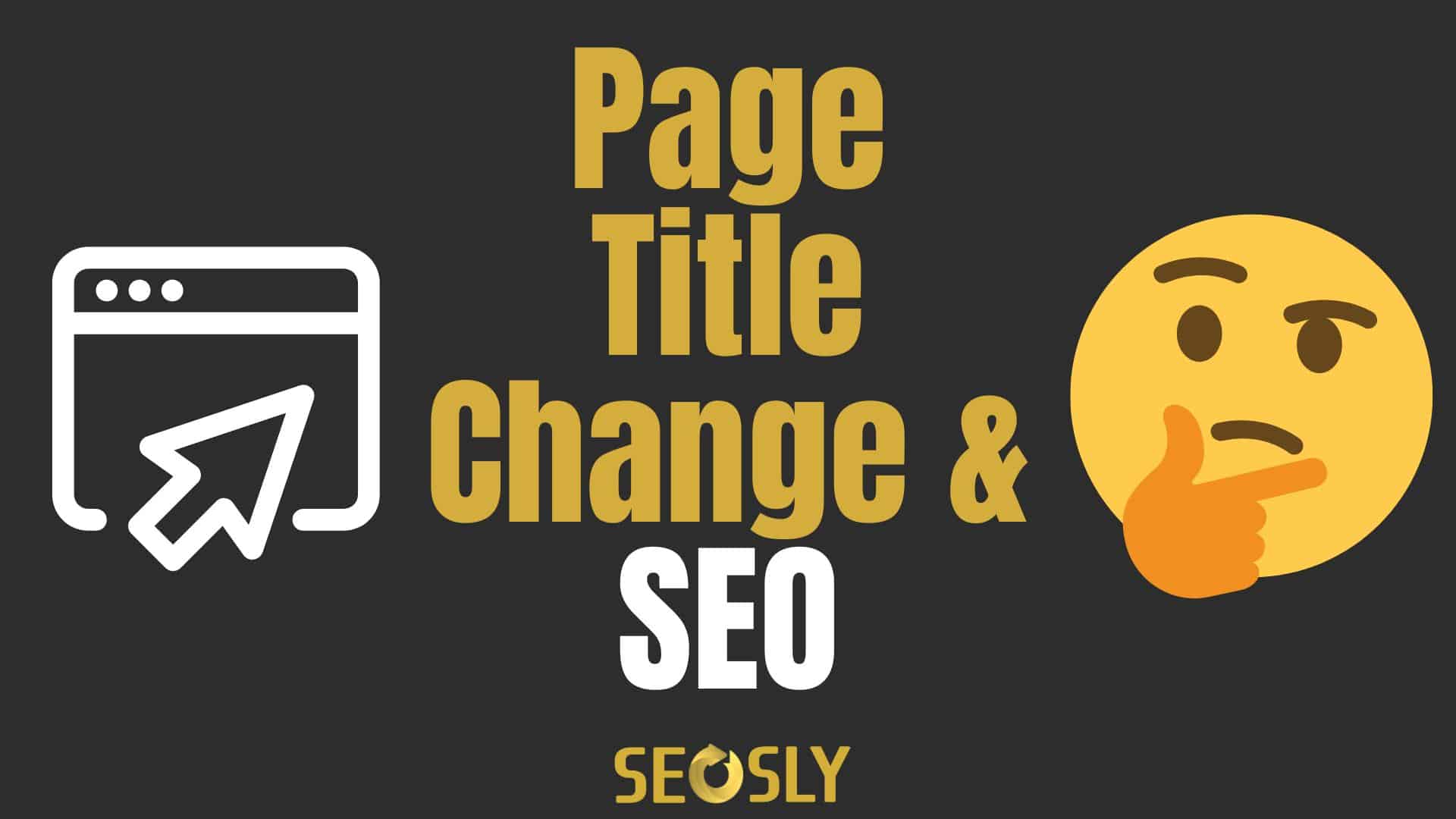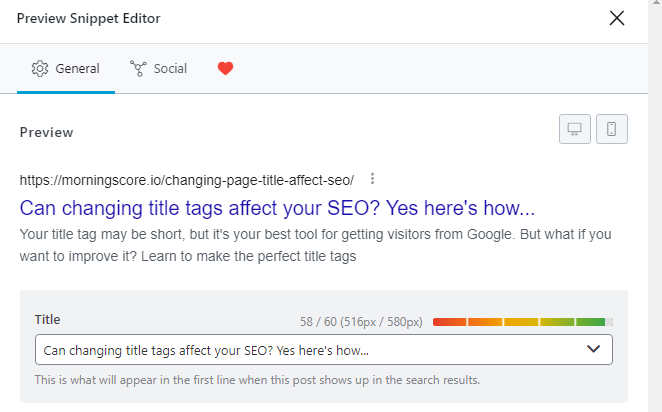Yes, changing a page title can affect SEO. It’s one of the most important on-page elements.
A well-crafted title can improve your search rankings. In the ever-evolving world of SEO, page titles play a critical role. They help search engines understand what your page is about. They also influence whether users click on your link. Changing your page title can lead to better visibility and more traffic.
But, it can also harm your rankings if done incorrectly. It’s crucial to understand how changes impact SEO. You need to know the best practices for updating titles. This ensures you reap the benefits without risking your current search position. So, let’s explore how page titles impact SEO and what you should consider before making changes.

Credit: seosly.com
Introduction To Page Titles
Page titles are crucial for any website. They serve as the first impression for your content. Search engines and users both rely on page titles to understand the page’s topic. In this section, we will explore the importance of page titles and their role in SEO.
Importance Of Page Titles
Page titles are the initial point of contact. They appear in search results and browser tabs. A well-crafted title can attract users to your site. It directly influences click-through rates. Users decide to visit your page based on the title. It should be clear and relevant to the content.
Role In Seo
Page titles play a significant role in SEO. They help search engines understand the page’s content. Keywords in the title can improve your ranking. A good title can make your page more discoverable. It also affects how users perceive your site’s relevance. Optimized titles can lead to higher visibility in search results.
How Search Engines Use Page Titles
Page titles play a crucial role in SEO. Search engines rely on them to understand the content of a page. Effective titles enhance visibility and attract more traffic. But how exactly do search engines use page titles?
Crawling And Indexing
Search engines deploy bots to crawl web pages. These bots read the page titles to grasp the page’s subject. Titles serve as a primary indicator of the page content. Clear, concise titles improve crawling efficiency.
During indexing, search engines catalog pages based on their titles. A relevant title helps place the page in appropriate categories. This boosts the chances of the page appearing in related searches. Consistent use of keywords in titles aids in better indexing.
Ranking Algorithms
Search engines use complex ranking algorithms to decide page order in search results. Page titles significantly influence these algorithms. Titles with relevant keywords rank higher.
Unique and descriptive titles attract user clicks. This leads to better click-through rates (CTR). Higher CTR positively impacts rankings. Search engines view a high CTR as a sign of quality content.
Keep titles under 60 characters. This ensures full display in search results. Avoid keyword stuffing; it harms SEO. Focus on clarity and relevance instead.
Impact Of Changing Page Titles
Changing page titles can have a significant impact on your website’s SEO. A page title is a crucial element that search engines use to understand the content of your page. It also influences how users perceive your content in search results.
Let’s explore the immediate effects and long-term consequences of changing page titles.
Immediate Effects
When you change a page title, search engines may quickly notice. The new title can affect your page’s ranking in search results. A well-optimized title can improve your ranking. A poorly chosen title might lower it.
Users see the title in search results. A clear and relevant title can attract more clicks. If the title is confusing or less relevant, your click-through rate might drop.
Long-term Consequences
Over time, a new page title can affect your site’s overall SEO performance. Consistent, well-chosen titles can enhance your site’s credibility. This can lead to better rankings and more traffic.
Search engines evaluate the relevance and consistency of your titles. Frequent changes can signal instability. This might negatively impact your rankings.
Think about user experience too. Users may return to your site if they find your titles helpful and clear. This improves your site’s authority and trustworthiness.

Best Practices For Changing Page Titles
Changing the page title can impact your site’s SEO. This makes it crucial to follow best practices to ensure you maintain or improve your search rankings. This section will guide you through the best practices for changing page titles, focusing on keyword research and title length and structure.
Keyword Research
Keyword research is essential for effective SEO. Start by identifying relevant keywords for your content. Use tools like Google Keyword Planner or SEMrush to find popular search terms. Aim to include these keywords naturally in your page title. Avoid keyword stuffing. Make sure the title reads well and makes sense to your audience.
Title Length And Structure
Title length matters for SEO. Keep your page title under 60 characters. This ensures it displays fully in search results. A clear and concise title also helps users understand your content at a glance. Structure your title to include the primary keyword towards the beginning. This improves its visibility in search engine results pages (SERPs).
A well-structured title includes your brand name, if relevant. This can help build brand recognition. For example: “Best Practices for SEO | YourBrandName.” Always aim for clarity and relevance. A good title tells users what to expect from your content.
Case Studies
Changing the page title can impact your SEO. Case studies show that it may improve search rankings and click-through rates. Testing different titles can help find the best results.
Changing the page title can impact SEO results. Various case studies show this effect. These studies reveal both successful outcomes and common errors. Understanding these can guide your SEO strategy.
Successful Examples
Many businesses have seen positive changes. For example, a tech blog updated its page titles. They shifted from generic to more specific titles. This change boosted their click-through rate by 20%. Another case involved an e-commerce site. They included relevant keywords in their titles. Their organic traffic increased by 30%.
Common Mistakes
Some changes can harm SEO. One frequent mistake is keyword stuffing. Overloading titles with keywords can lead to penalties. Another error is changing titles too often. This confuses search engines and reduces rankings. Lastly, ignoring user intent is a big mistake. Titles should match what users are searching for. “`
Monitoring And Measuring Impact
Changing your page title can impact your SEO. Knowing how to measure this change is crucial. Monitoring and measuring the impact helps you understand if the change was beneficial.
Analytics Tools
Using analytics tools is essential. These tools help track and measure your website’s performance.
Here are some popular tools:
- Google Analytics: Tracks website traffic and user behavior.
- Google Search Console: Monitors website search performance.
- SEMrush: Analyzes keyword rankings and competitor performance.
- Ahrefs: Provides backlink analysis and keyword tracking.
Key Metrics
Several key metrics help measure the impact of a page title change. Focus on the following:
Metric | Description |
|---|---|
Click-Through Rate (CTR) | The percentage of users who click on your link after seeing it. |
Impressions | The number of times your page appears in search results. |
Average Position | Your page’s average ranking in search results. |
Bounce Rate | The percentage of users who leave after viewing only one page. |
Organic Traffic | The number of visitors coming from search engines. |
Track these metrics before and after changing your page title. This helps you see how the change affects your SEO performance.
Common Myths And Misconceptions
When discussing SEO, many myths and misconceptions arise. Some believe that changing a page title can lead to severe consequences. This section will debunk common myths around this topic.
Seo Penalties
Many fear that changing a page title triggers SEO penalties. This belief is not true. Google does not penalize sites for updating titles. In fact, regular updates can improve relevance.
Penalties occur for actions such as keyword stuffing or using misleading titles. Changing a title to reflect content better is not a penalty-triggering action. Ensure titles remain relevant and accurate.
Effect On Traffic
Another misconception is that changing a page title causes a drop in traffic. While a minor fluctuation can happen, it is often temporary. If the new title is more relevant, traffic can improve.
Use keyword research to choose the best titles. Ensure the new title aligns with user intent. This practice can lead to better engagement and higher click-through rates.
To illustrate:
Old Title | New Title | Effect on Traffic |
|---|---|---|
Best Laptops 2022 | Top Laptops for 2023 | Potential Increase |
How to Train Dogs | Effective Dog Training Tips | Improved Relevance |
These examples show how changes can positively impact traffic. Focus on user needs and search intent.
Future Trends In Page Title Optimization
The digital landscape is ever-evolving. Keeping up with page title optimization trends is crucial. Search engines are becoming smarter. They prioritize user intent and experience. Here are some key future trends in page title optimization.
Ai And Machine Learning
AI and machine learning are transforming SEO. These technologies help search engines understand content better. They analyze user behavior and adapt. Your page titles should be dynamic. They need to reflect user intent accurately.
Example:Old TitleNew TitleBest Pizza RecipesTop 10 Pizza Recipes You Must Try
Key Points:
Use dynamic keywords
Focus on user intent
Adapt based on user behavior
Voice Search Adaptation
Voice search is growing. People use voice assistants like Siri and Alexa. Your page titles should be conversational. They need to match how people speak. Using natural language is key.
Example:Old TitleNew TitleCheap Flights to NYCWhere Can I Find Cheap Flights to NYC?
Key Points:
Use conversational phrases
Include question-based titles
Optimize for long-tail keywords

Credit: morningscore.io
Frequently Asked Questions
How Does Changing Page Titles Impact Seo?
Changing page titles can impact SEO by affecting search engine rankings. It can improve or worsen visibility based on relevance.
Is It Safe To Change Page Titles Frequently?
Changing page titles frequently can confuse search engines. It’s best to make thoughtful, strategic changes rather than frequent ones.
Can Page Title Changes Improve Click-through Rates?
Yes, optimized page titles can improve click-through rates by attracting more users with relevant and compelling content.
Do Page Title Changes Affect Keyword Rankings?
Yes, page title changes can affect keyword rankings. Ensure titles include targeted keywords to maintain or improve rankings.
Conclusion
Changing your page title can impact your SEO results. A well-chosen title attracts more clicks. This leads to higher engagement. Search engines notice these changes. So, updating titles helps your site rank better. Always use relevant keywords. Keep titles clear and concise.
Avoid using misleading titles. Consistent updates can improve your SEO over time. Remember, quality content matters too. Balancing both boosts your online visibility.





